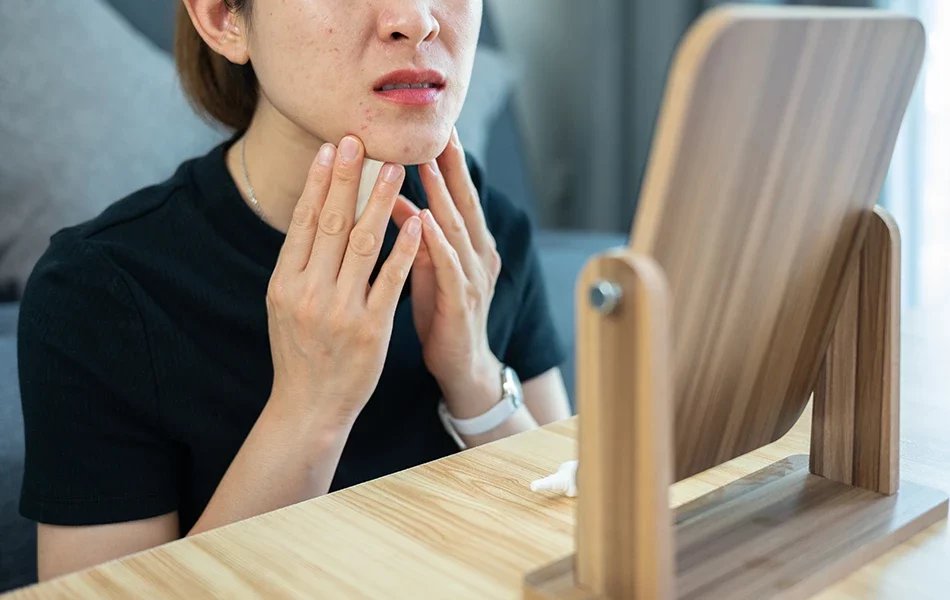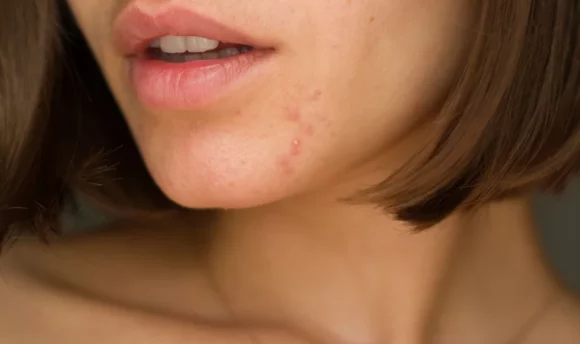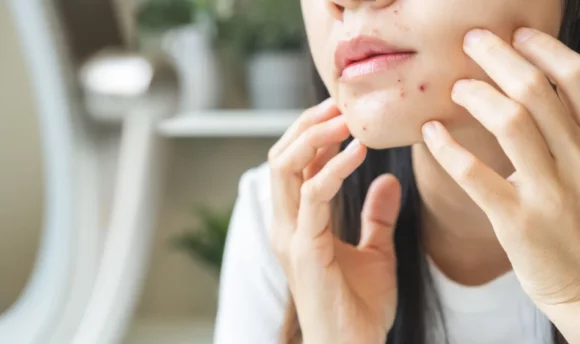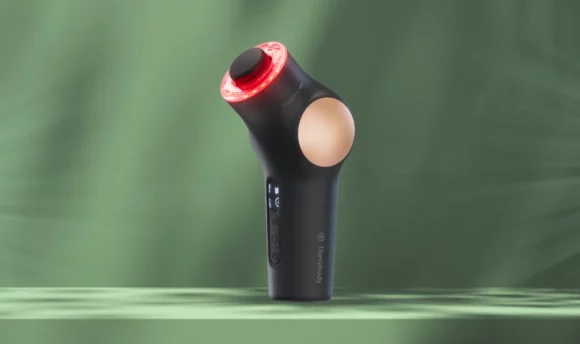Conquering Chin Acne: Causes, Types, and Solutions
Explore the common causes of chin acne and ways you can eliminate these stubborn pimples for good.

Do you have chin acne that will not go away?
Pimples on your chin can be frustrating and painful. They may come in the form of cysts, whiteheads, or pustules that make your face extremely sensitive.
Discover the best prevention tips and ingredients for soothing your skin to treat acne. You can also explore the causes of acne and the types of spots you could get.
Key Facts about Chin Acne
- Several factors can contribute to chin acne, such as hormones, clogged pores, and bacteria.
- Blackheads, cystic pimples, nodules, and pustules are the 4 types of chin acne.
- The best way to prevent chin acne is to develop a good skincare routine, eat healthily, avoid dairy products, and not overuse spot treatments.
- You can get rid of chin acne for good by using retinol or hydrocolloid patches. Consult your dermatologist if nothing helps.
Understanding Chin Acne: What Causes It?
There are many factors that contribute to acne vulgaris. Some people experience severe acne due to genetics, and others have hormonal acne during their periods. Learning about what causes acne could help you find treatment.
Below are potential causes of chin acne:
Hormones
Hormones play a huge role in acne because they control sebum – an oily substance your glands produce to hydrate the skin. When hormones such as androgen increase during a period of pregnancy, excess oil production will occur. This means that oil sits on top of your skin and clogs pores around your chin, forehead, and nose.
Blocked pores can lead to chin pimples. The hormones estrogen, progesterone, and testosterone may also trigger inflammation and acne. Inflammatory acne causes red, swollen, and sore spots.
Clogged pores
As a side effect of hormonal fluctuations, you may experience blocked pores. However, dead skin cells and dirt can also clog your pores and cause chin acne. Anything that fills these tiny holes in your skin will irritate the hair follicles and create an inflamed spot due to infection.
Bacteria
Cutibacterium acnes are usually responsible for chin acne. This bacteria resides in your sebaceous glands, but too much can trigger acne breakouts and inflammation. Hyperactive sebaceous glands (sebaceous hyperplasia) cause the bacteria to grow and multiply on your skin.
Bacteria can also come from unwashed pillowcases, bath towels, hands touching your face, and face masks. After wearing a face mask for a long time, you could get maskne around your mouth and chin. This is due to bacteria and yeast forming in the humid environment beneath the mask.
Types of Chin Acne
Acne comes in many forms, whether that’s cystic breakouts or blackheads. The type of spot you get could represent the hidden cause. For example, nodular acne can stem from an inflammatory skin condition.
The following are common types of chin acne:
Blackheads
Blackheads are blocked pores that contain excess oil, dead skin cells, or bacteria. They are also called open comedones because they leave small black dots on your skin. You can get blackheads anywhere on your body, including the face, shoulders, back, and chest.
Cystic pimples
Cystic acne is a painful skin condition that leaves large breakouts on your face or body. They can also cause swelling and inflammation. Cysts usually appear because your pores are clogged with bacteria, which infects the hair follicle and triggers a wound-healing response. In turn, your body creates a pimple to protect the pore while it heals.
Nodules
Nodules are growths or lumps that develop beneath your skin. They form due to an overgrowth of cells in your thyroid gland. This acne can be hard and painful, meaning you can only treat them with prescribed medication.
Pustules
Pustules are blister-like sores that contain oil and pus from an infected pore. They can be painful due to the yellowish fluid putting pressure on your skin. Bacteria and excess oil are common causes, but it’s also possible to experience pustules if you have an infectious disease.
How to Prevent Chin Acne? Here Are 7 Ways to Clear Up Your Skin
Preventing acne is possible through healthy skincare and lifestyle habits. You can try these 7 tips at home to clear your chin and bring back a natural glow.
Here are some ways you can prevent chin acne:
#1 Have a proper skincare routine
You need a consistent skincare routine to improve your overall skin health. This includes washing your face with a cleansing gel, moisturizing dry areas, and adding a spot treatment. It might be tempting to skip these steps when you’re tired, but removing bacteria from your face is essential for preventing chin acne.
Choose products that contain benzoyl peroxide, salicylic acid, tea tree oil, or azelaic acid to eliminate spots. These ingredients have anti-inflammatory properties and cleansing agents that penetrate your pores to remove bacteria and dirt.
#2 Try to eat healthier
Several dietary factors contribute to the natural skin-healing process, including what you eat and how much you consume. Therefore, following a well-balanced diet is essential for treating and preventing pimples.
Research suggests that eating too many processed foods such as white bread, pasta, cakes, and candy can increase the insulin-like growth factor 1 (IGF-1) hormone in your blood. Excess IGF-1 encourages your glands to produce more sebum oil, leading to clogged pores and acne.
To prevent blocked pores, consume fruits and veggies, along with legumes and white meats like chicken and turkey. You should also reduce your portion sizes to prevent high blood sugar and weight gain – two factors that increase the risk of pimples.
The best acne-reducing foods include:
- Spinach
- Tomatoes
- Blueberries
- Pumpkin seeds
- Salmon
- Brown rice
- Carrots
- Almonds
- Strawberries
- Greek yogurt
#3 Learn how to cope with stress
Stress management is key for protecting your skin. High stress levels release more cortisol and androgen hormones, which increase sebum oil production. Too much oil on your skin will clog your pores and exacerbate acne.
You can cope with stress by trying guided meditation or yoga. These calming techniques may reduce anxious thoughts and give you a sense of peace. Regular exercise, whether that’s treadmill running or quiet morning walks, can also relieve stress because your body activates feel-good endorphins.
#4 Choose non-comedogenic cosmetics
Non-comedogenic refers to products that won’t clog your pores. These products usually contain light ingredients that sit on your skin rather than irritate the hair follicles. You should always check the label of each skincare product and cosmetic before applying it to your face.
Some skin-friendly ingredients include:
- Cocoa butter
- Jojoba oil
- Isopropyl palmitate
- Coconut oil
- Niacinamide
- Vitamin E
- Aloe vera
- Benzoyl peroxide
- Salicylic acid
#5 Avoid dairy
Reducing your dairy intake could prevent hormonal acne on your chin. Research suggests that dairy products such as cow’s milk, yogurt, and cheese can upset your hormonal balance. In turn, your body cannot regulate sebum oil efficiently, meaning you’re more at risk of getting inflamed pores.
#6 Don’t overuse spot treatments
It might be tempting to use a spot treatment every night, but it won’t do much for your skin. In fact, overusing these treatments can make acne worse because you’re not allowing the skin to breathe.
Instead, only use spot creams or patches when the spot is inflamed. Little pimples will go away faster, so only treat cysts or whiteheads if they’re painful. Spot treatments help acne to heal and prevent bacteria from making spots worse.
#7 Exfoliate your skin regularly
Exfoliating your skin will remove dead skin cells and dirt clinging to your pores. You could use tools such as body buffers or wash your face with a gentle scrub to replenish the outer layer of your skin. Doing this cleanse once every few days could prevent acne because there are no dead skin cells to irritate your hair follicles.
What Are the Most Effective Treatments for Chin Acne?
There are many effective ingredients that could treat hormonal chin acne, cysts, or regular pimples. Before trying a new product, speak to your doctor about treatments that suit your skin’s condition.
Ingredients that could help treat chin acne include:
#1 Retinol
Retinol is a form of vitamin A that supports skin cell regeneration. It can help the outer layer of your skin (epidermis) repair and form new skin cells after painful acne breakouts. This ingredient will also exfoliate your face or body to remove dirt, dead skin cells, and sebum oil from blocked pores.
You can get retinoids as a topical treatment from your doctor. Chemical peels, which is another form of exfoliation, will usually contain retinol to treat acne and reduce hyperpigmentation, crow’s feet, and scarring.
#2 Spot treatments
Spot treatments are creams that you leave on pimples overnight. They contain acne-cleansing ingredients like salicylic acid or hyaluronic acid to reduce the appearance of acne. All you need to do is rub a small layer of the cream over your spots and leave that on for a few hours.
#3 Hydrocolloid patches
Hydrocolloid patches are small stickers that cover your spots. The inner layer of these patches absorbs pus and bacteria from cysts or whiteheads to help them heal. A spot patch can also prevent dirt from entering your pores and increasing acne breakouts. Put these stickers on overnight to reduce swelling and redness.
#4 Tea tree oil
Tea tree oil is one of the best ingredients for treating acne because it has anti-inflammatory and antimicrobial properties. Applying a small amount of oil to your pimples can relieve pain and soreness. It also contains betaine salicylate, which is a fatty acid that exfoliates your skin and unclogs pores.
You can get tea tree oil face washes, serums, soothing gels, and face masks.
#5 Oral medication
Doctors can prescribe oral antibiotics if your acne is more severe. You may need medication for acne, such as cysts, nodules, or pus-filled sores that have a higher risk of infection.
A medical professional will treat hormonal acne through oral contraceptives to help balance your hormones. Other forms of medication include steroid injections to heal cysts and chemical peels to soothe post-inflammatory hyperpigmentation.
FAQs
Acne around your chin and jawline usually stems from hormonal fluctuations. Periods, pregnancy, and menopause are common instances that could cause chin acne.
Yes, stress acne affects the oiliest parts of your face, which includes the chin, nose, and forehead. Research suggests that stress encourages more sebum oil production, leading to clogged pores and acne flare-ups.
You can treat chin acne at home using salicylic acid or benzoyl peroxide. These ingredients are in many acne-cleansing products, such as face washes, foaming gels, creams, serums, and face masks. If you experience stubborn pimples, speak to a dermatologist about getting acne treatment.
You can’t get rid of pimples overnight, but you can reduce any redness and swelling. Apply an ice bag on your spots before covering them with a pimple patch. These techniques should make your acne appear less inflamed.
A Word From a Dermatologist
Keep your skincare routine simple when treating chin acne.
You don’t need more than 3 products to protect your pores and prevent stubborn pimples. So, invest in a high-quality face wash, moisturizer, and spot treatment to get rid of chin acne.
More ways of improving your skin include following a healthy diet, wearing oil-free sunscreen, and avoiding touching your face throughout the day. You should also drink lots of water to help your body flush out acne-causing bacteria. Consistent hydration will prevent dryness and inflammation on your face.
For more guidance, seek advice from your local dermatologist. They can evaluate your skin condition and find the best products for acne-prone skin.
Conclusion
Chin acne can be a sign of hormonal fluctuations, blocked pores, or a buildup of bacteria from poor hygiene.
Using ingredients like benzoyl peroxide and salicylic acid could help clean your pores and prevent stubborn pimples. You should also invest in a proper skincare routine by trying topical treatments from a dermatologist.
If your acne becomes distressing or won’t go away, speak to your doctor. A medical professional can prescribe treatment based on your skin’s current health.

















































 Select your language:
Select your language: 








